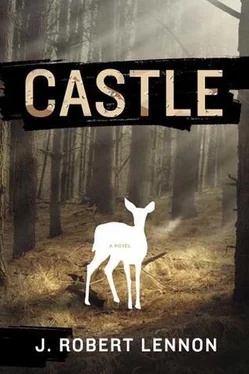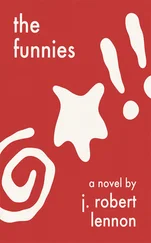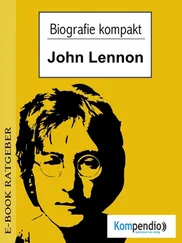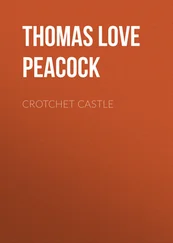She crept around the edge of the room, never once taking her eyes off me. When she passed through the doorway, I followed, into the hall, into the front room, over the threshold, and onto the stoop. There I remained, making sure she left. I watched her walk to her truck and open the door.
“I’m sorry, Eric,” she said to me. “I was only trying to help you.”
“Your kind of help is of no use to me.”
The fear was gone from her face now, supplanted by mere sadness, no doubt at the miserable life she had resigned herself to, and to which she was about to return.
For a moment, she appeared ready to say something. But in the end she climbed into the truck and drove away. I stood on the stoop for a long time, watching the truck recede into the distance of Lyssa Road. When finally it disappeared from sight, I waited there in the spring air for the tightness in my throat to subside.
By the time I turned to go back into the house, darkness had fallen. I had left no lights on, so I groped my way to the banister, slowly climbed the stairs, and stumbled into bed. I had only time to consider how little difference there appeared to be between sleeping and lying awake in darkness, before I fell soundly asleep.
The next morning, I woke to a new stiffness in my joints and an overall sense of disappointment and embarrassment. My failure in the woods and anger at my sister the day before had thrown my mind into disarray, and I felt the need to change tack. I would work inside the house, I decided — continue my improvements and try to enjoy the simple pleasures of labor.
I took up my pencil and clipboard, made a list, and drove to Milan, and the hardware store. My hope was not to have to encounter the tall, thin clerk who had affronted me some days before, and at first, when I pushed my cart in through the automatic doors, I thought that my hope would be realized. The only clerks visible were a couple of young women.
But fifteen minutes later, when I approached the checkout line, there he was. The store was quite crowded, despite the early hour, with middle-aged men wearing tool belts and sports-team-branded sweatshirts. Local contractors and builders, no doubt, preparing for their day’s work. I wheeled to the back of one of the young women’s lines, pretending not to see my nosy acquaintance. But in a frustrating trick of fate, the man in front of me had some intractable problem involving his company charge account, and meanwhile the tall clerk’s line quickly dwindled to nothing. He looked up at me from his register and signaled for me to pull into his lane.
I would not be so rude as to refuse. With a heavy heart, I did as he suggested, and began to unload my items onto the counter.
“Morning, Mr. Loesch,” he said.
“Hello,” I replied, surprised. Had I told this man my name? Perhaps he had remembered it from my credit card. I noticed that his name tag read RANDALL. But I declined to use this information.
To my temporary relief, Randall did not speak as he dragged my purchases over the price scanner and packed them into plastic bags. The credit card machine, however, took its time accessing my account, and as we stood waiting, he said to me, without turning, “You met a friend of mine the other day.”
Determined not to become annoyed, I replied with as much cheer as I could muster. “Is that so?”
“Mmm-hm,” he said, nodding. “Paul Hephner. The electrician.”
“Oh yes. Heph. He seems very good at what he does.”
“He’s the best there is,” Randall agreed. “We go way back. Hunting buddies.”
“I see.”
The cash register, at last, kicked back into life, and a receipt slid out silently from between its metal teeth. Randall tore it free and set it on the little transaction platform before me, along with a pen.
As I signed my name, he said, “You a hunting man, Mr. Loesch?”
“Not really,” I admitted.
“Just as well,” he told me, accepting the pen and receipt. He tucked my copy into one of my sacks and faced me, his arms crossed. “Those woods are a bitch to get through. And there isn’t much there.”
I transferred my bags to the cart and prepared to leave. “So you’ve hunted on my land,” I said.
“Tried to.” His eyes narrowed slightly.
I was free to leave, if I so desired. Nevertheless, and despite my reluctance to encourage this man in any way, I couldn’t resist making a small inquiry.
“Let me ask you something,” I said. “When you explored those woods, did you ever reach the rock outcropping?”
He seemed to relish the question. A small smile stole over his gaunt face, and he crossed one leg over the other and leaned back against his cash register. “Oh, I remember the rock you mean. Practically a little mountain, isn’t it? Just sticking up over the trees?”
“That’s the one.”
“If I recall, there was some talk of making our way to it, that day.”
“Yes?”
His smile spread into his eyes, and it was clear that he was enjoying playing with my expectations. He stroked his chin, gazing into space, pretending to think.
“But in the end,” he said finally, “we didn’t bother. Too much trouble.”
“I see.” I heard, in my own voice, more disappointment than I would have liked to betray.
“Don’t know that there’s anything to see, though. It’s just a rock, I’d imagine.”
“Of course.”
“You enjoy your renovations, Mr. Loesch.” I detected a bit of irony in his mode of address, and it was true, he was some years my senior, and by rights ought to be calling me Eric. I briefly considered telling him to do so in the future. But I had wasted enough time already, and I did not wish to further erode the wall of privacy I had erected between us. I thanked him curtly, and wheeled away, my muscles aching.
It was a bright, breezy day, and a wind carried with it a balm, a round moistness with a hint of warmth. It was perhaps this warmth that had caused an odor to begin drifting through the rooms of the house. I suppose I had noticed the odor before — a flat, dank mustiness — but it was only now that it had grown intense enough to demand my immediate attention. To this end, I had included among my purchases from the hardware store a bag of quicklime, a bottle of antifungal spray, a respirator with several sets of filters, and a package of extra-heavy-duty plastic garbage bags. I would find whatever it was that had grown moldy, and I would throw it away.
In the back of my mind, however, and creeping ever closer to the fore, was the understanding that I would have to work in the cellar, under the disheartening glare of a single ancient bare incandescent bulb. This inevitability was causing me distress, and the distress grew more powerful with every passing moment. I unloaded my car, removed the respirator from its package, screwed in the filters, and adjusted the straps, taking as long as I possibly could, and all the while feeling my heart beat faster and harder, and my head fill up with toxic fog.
Allow me to state that I am not a coward. Indeed, I am a man of some considerable courage. This is not a boast, merely a statement of fact. I have faced great dangers in my life, have stared death in the face and not backed down. But those dangers were clear and well defined, and my superior skill in the areas of planning and prevention were able to protect me against harm. My impending journey into the cellar, meanwhile, was something different. There was no reason for me to fear it — indeed, I had been living and working above it for some time now, and had neither heard nor seen anything that would indicate danger. But reason did not come into it. My fear of the cellar was irrational, and there was nothing I could do that would erase it. I would have to carry it with me, bear it upon my shoulders as I worked, endure it until my work was through.
Читать дальше











